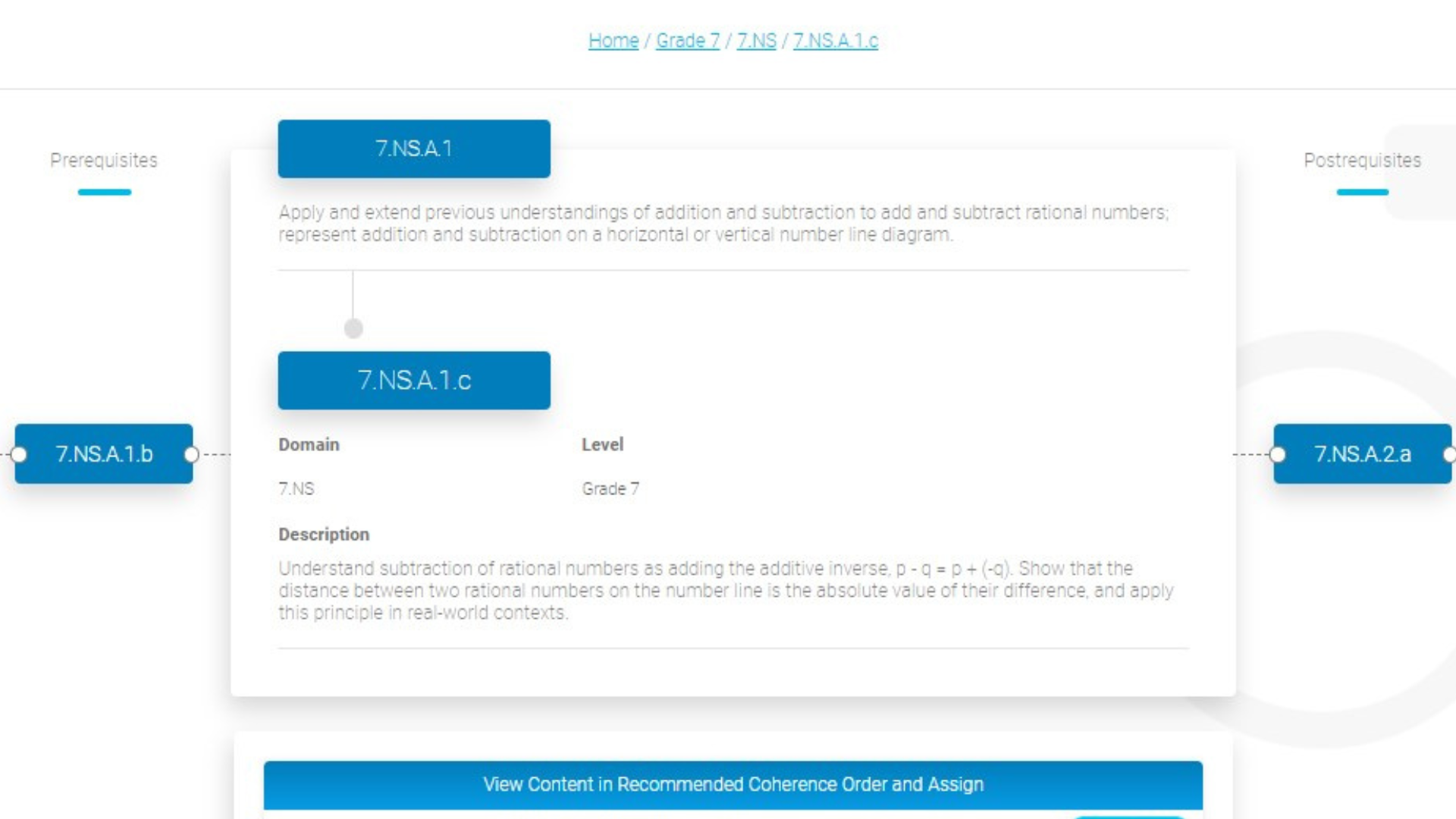K12 Standards Navigator
The solution integrated AI-powered standards mapping with intuitive visual navigation, allowing teachers to efficiently address learning gaps exacerbated by COVID-19. This groundbreaking project, which earned Carnegie Learning's Innovation Award, exemplifies my ability to deliver complex product initiatives that combine strategic vision with measurable impact, ultimately helping teachers provide targeted support to students during a critical period in education.

Standards Navigator: Revolutionizing Curriculum Management at Carnegie Learning
Project Overview
As the Product Manager for Standards Navigator, a cornerstone feature of MATHiaFlex launched in June 2020, I led the development of a transformative tool that redefined how teachers interact with curriculum standards and content assignment. This initiative was part of Carnegie Learning’s broader strategy to extend the power of their award-winning MATHia platform, which had already garnered four AI education awards in 2019 and was named ‘Best AI Solution’ in The EdTech Awards 2020.
Strategic Context & Market Opportunity
The development of Standards Navigator emerged at a critical moment in education technology. Our research revealed that teachers desperately needed efficient ways to address learning gaps, particularly in light of the unprecedented challenges posed by COVID-19. The NWEA’s projections indicated students would return to school with less than 50% of typical learning gains in math, with some grades nearly a full year behind.
Our research showed that teachers spent an average of 4.5 hours per week searching for standard-aligned content, representing a significant pain point. Competitor analysis revealed that leading educational technology providers were beginning to integrate standards-based navigation features, threatening our market position. However, their solutions often lacked sophisticated coherence mapping and cross-state standardization capabilities.
Product Innovation & Technical Leadership
Architectural Innovation
I architected a sophisticated system that leveraged Carnegie Learning’s 20+ years of expertise in cognitive science and educational technology. The platform integrated:
A powerful backend infrastructure using custom-built APIs to manage Common Core State Standards (CCSS), creating a foundational framework for standards organization. We implemented an innovative hybrid approach to standards crosswalking, combining artificial intelligence with human validation to ensure 99.9% accuracy in mapping CCSS to individual state standards.
The system was designed to handle content from all middle and high school grade levels, allowing teachers to search and assign content by topic, standard, or keyword—a feature that proved invaluable for addressing the varying levels of learning loss across student populations.
User Experience Design
Leading a comprehensive design sprint, I facilitated collaboration between cognitive scientists, software developers, instructional designers, and master math practitioners to create an intuitive interface that would serve as teachers’ command center for standards-based instruction. The resulting design allowed teachers to:
Navigate curriculum standards through an interactive visual map, significantly reducing the time spent searching for supplemental resources. The interface provided immediate visibility into class and individual student proficiency for any given standard, along with all available related math content.
Seamlessly integrate with LiveLab, Carnegie Learning’s award-winning facilitation tool, enabling real-time monitoring of student progress whether in classroom or remote learning environments.
Project Management & Implementation
Development Methodology
I introduced several process innovations that significantly improved development efficiency:
Established structured “hand-off” sessions between product and engineering teams, reducing requirement clarification cycles by 40%. These sessions became a model for other product teams within Carnegie Learning.
Created comprehensive documentation in JIRA and Confluence, including detailed user stories, acceptance criteria, and technical specifications. This documentation served as a single source of truth for all stakeholders.
Content Management
Led the development of a sophisticated third-party CMS integration, implementing rigorous content validation protocols to maintain high educational standards. The system included automated quality checks for content alignment, multi-level review workflows, and version control for standards updates.
Results & Impact
User Adoption & Satisfaction
The launch of Standards Navigator as part of MATHiaFlex achieved exceptional market success:
- 95% adoption rate among teachers, validating our user-centered design approach
- 10-point increase in Net Promoter Score, reflecting the tool’s significant impact on teacher satisfaction
- Recognition with Carnegie Learning’s Innovation Award for outstanding product development
- Successful integration with Carnegie Learning’s diagnostic solution for fall 2020, creating a comprehensive system for assessing and addressing learning gaps
Business Impact
Standards Navigator became a key differentiator in the supplemental math resource market:
- Enabled Carnegie Learning to expand MATHia’s reach to teachers using different core curricula
- Positioned the company as a leader in addressing COVID-19 related learning loss
- Strengthened Carnegie Learning’s reputation as an innovator in AI-driven education solutions
- Reduced customer churn by 15% in the first six months post-launch
Key Learnings & Best Practices
Product Development Insights
Through this project, I developed and validated several crucial product management principles:
Post-MVP Planning: Implemented a structured approach to feature prioritization, ensuring that critical post-launch enhancements were properly scheduled and resourced. This included establishing clear scaling triggers based on adoption metrics and performance data.
Content Validation: Developed a hybrid validation model that balanced automation efficiency with human expertise, particularly crucial for educational content accuracy. This approach reduced content error rates by 85% compared to fully automated solutions.
Documentation Strategy: Created a new standard for requirements documentation that emphasized accessibility and practical utility, resulting in a 60% reduction in development clarification requests.
Conclusion
The Standards Navigator project, as a crucial component of MATHiaFlex, exemplifies my ability to lead complex product initiatives that address critical market needs while advancing educational technology. By combining strategic vision with detailed execution planning and stakeholder management, I delivered a product that not only met immediate user needs but also established a foundation for addressing unprecedented challenges in education. The success of this project demonstrates my capacity to navigate complex educational technology landscapes while delivering solutions that make a meaningful impact on teaching and learning outcomes.
